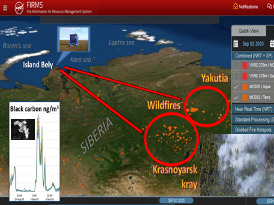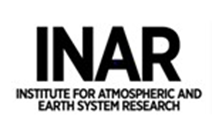Unprecedented high black carbon in the Arctic observed in September 2020
Authors: Dr. Olga Popovicheva, Vasilii Kobelev, Dr. Marina Chichaeva, Acad., Prof. Nikolay Kasimov
Lomonosov Moscow State University, Moscow, Russia

Unprecedented high black carbon in the Arctic is observed in September 2020 in the Northern Siberian Arctic, at the research aerosol station on the island Bely. The black carbon concentrations early in September were exceeded 20 times the arctic background. They are found to be even higher than the highest arctic haze concentrations observed in December 2019. Monthly averaged black carbon concentration in September 2020 exceeded 3 times that one in previous summer months. Such strong event is a result of large-scale air mass transportation from Eurasian continent in the period of strong wildfires in western Siberia, namely in Krasnoyarsk Kray and Yakutia, where around one million hectares of forest were burned out in August 2020.
Black carbon is a short - living climate forcer, it plays a significant role especially in the Arctic environment due to heating the atmosphere and changing the radiation balance while depositing on snow and ice. Analysis of black carbon in the Arctic atmosphere shows a contribution of anthropogenic combustion of fossil fuels and natural wildfires to the Arctic atmosphere chemistry as well as of the main characteristics of Arctic aerosol pollution.
The new research station “Arctic Scientific Aerosol Complex” in the Russian Arctic was installed on Bely island, Kara Sea, in April 2019, in cooperation between Lomonosov Moscow State University and Scientific Center of Arctic Research (Salekhard) (https://peexhq.home.blog/2019/12/11/new-research-aerosol-stations-in-the-russian-arctic). It is located on the pathway of air masses from the Northern Siberia regions of high industrial and residential activity to the Arctic. Researchers from Moscow State University (https://www.msu.ru/science/news/uchyenye-otkryli-novuyu-aerozolnuyu-stantsiyu-v-arktike.html) perform the long-term measurements of black carbon using aethalometer AE33 (Magee Scientific www.aerosol.eu), as of the most ecologically and climatic significant component of the polluted atmosphere.
Operation of Arctic Scientific Aerosol Complex is supported by project Russian Fund for Basic Research №18-60084.





